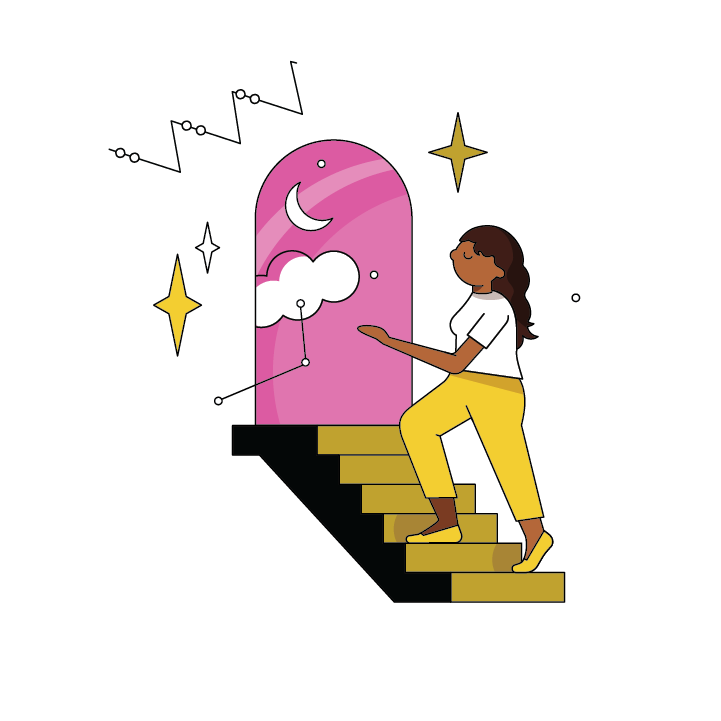Mental Health Resources
By Cinnamon Janzer
Planning for Change
Prior to 2018, Mary Redd was in and out of sometimes three-month stints at the hospital. She felt like she didn’t need her bipolar medication and had a social worker who was helpful but overworked and unreliable. Redd would call when she needed help but wouldn’t hear back for days. It was then that she was referred to Mental Health Resources, MHR for short — a non-profit organization offering community-based mental health and substance use disorder services to adults recovering from serious mental illnesses. MHR is a grantee partner of the Constellation Fund.
When Mary started working with MHR’s Assertive Community Treatment (ACT) team in 2019 she was civilly committed and receiving Electroconvulsive Therapy. MHR’s ACT team provides comprehensive, in-context, integrated care to those struggling with serious and persistent mental illnesses. The ACT team began seeing Mary three times a week to assist her with reaching goals. After a while she began to develop a trusting relationship with the team and started to actively participate in her recovery. Over time and with support from her ACT team Mary has quit smoking tobacco, visited annually with her primary care physician for preventative care and completed multiple dental appointments.
Now an MHR caseworker visits Redd once a week. They gave Redd a pill box to help her stay on track with taking her medication each morning and night, as well as a pager she can use to get immediate help any time she needs it.
Today, thanks to MHR, Redd doesn’t experience bipolar symptoms and has been out of the hospital for the last five years. “They care about you. They really support you and try to help you do whatever goal you have,” Redd says.
Mental Health Resources was incorporated in 1976 with a mission of having both short-term and long-term community impact. In addition to meeting immediate needs with the consistent, on-the-ground services they offer clients like Redd, MHR also works to alleviate systemic issues in health care, and break down persistent myths about people with mental illnesses or substance use disorders.

“The goal is to become a hospital without walls. We provide all the services that individuals would receive in an inpatient setting, but actually in their own home,” explains Mary Warin, team lead on MHR’s Hennepin County ACT team. “We serve 75 individuals in Hennepin County and develop treatment plans for each one of them to help them accomplish their goals.”
MHR’s Health and Wellness team helps clients achieve goals that go beyond their mental health by developing, improving, and measuring initiatives targeting dental health, commercial tobacco treatment, respiratory health, and other gaps in care faced by the people they serve. They also provide health-related training to MHR case workers so they can work with mental health clients to also improve their physical health.
MHR’s person-centered focus is vital for the community it serves and treats clients as the decision makers in their healthcare journey — something that does not always happen for people living with a serious mental illness. Hennick recalls one client telling her about a time she asked her doctor about quitting smoking. The doctor discouraged it, saying that quitting would be too stressful. “That’s just poor care.” Hennick says. “It’s discrimination against people with mental illness because of a belief that people with mental illnesses don’t care about their health.”
“Tobacco companies have long targeted people who live with substance use disorders, with mental illnesses, and BIPOC people, LGBTQ communities, and folks with lower incomes,” says Jourdan Hennick, MHR’s Health and Wellness Coordinator. The numbers tell a difficult story:
People living with serious mental illness die, on average, 10 to 25 years sooner than the general population, so the impact can be immense.
Less than 14% of Minnesota adults smoke, but that figure rises to 55% among MHR’s client population. In 2022, among MHR clients who received nicotine replacement therapies through the Health and Wellness program, 51% have cut down on tobacco use and 13% have quit altogether.
MHR’s approach is to embed health and well-being directly into the services they provide so that all the people they serve have opportunities to address their individual needs and goals This work is not reimbursable by insurance plans and requires flexibility and creativity. The unrestricted grant funds from Constellation allow MHR opportunities to try these new approaches, sustain effective initiatives, and support the process of using data to improve and advance their efforts.
Low Medicaid reimbursement rates or lack of insurance coverage for dental care pose other major challenges for MHR participants. Dental care providers often say that the cost of providing treatment to Medicaid patients exceeds the funds they receive through the reimbursement-based program. As a result, just 27.5% of Minnesota adults enrolled in Medicaid have had dental appointments in the last year. Using grant funds, MHR has established a mechanism to cover the cost of some vital basic dental care that may otherwise go unmet. Constellation supports the Health and Wellness team to provide targeted support and care coordination for individuals with dental care needs they cannot afford. All three of MHR’s county ACT teams exceed the statewide metric. “Our team has prioritized dental appointments more than ever, now that we have the ability to pay for some of the cost,” says Warin.
"We provide all the services that individuals would receive in an inpatient setting, but actually in their own home."
Mary Warin
MHR’s Hennepin County ACT Team
Hennick will often accompany clients into the exam room to help calm their nerves about a commonly stress-inducing experience. Going to appointments like these in-person is about providing more than just logistical support. It’s also about personal support. She helps them advocate for themselves in healthcare settings by supporting them to ask questions when they have them or flagging that the client needs a break when she notices stress bubbling up.
These results are possible because of MHR’s intentional approach to integrating a person’s physical health goals with their mental health care. “For years it was thought that mental health should address needs from the neck up and primary care doctors would do everything else,” says Hennick. “But we have to work together across professions.”
This comprehensive approach helps MHR prevent premature loss of life and cut down on the years of suffering that can stem from chronic health conditions in addition to mental illness and addiction. “Our staff are experts in talking with folks about motivation to change, and connecting people to the resources needed to make that change,” says Hennick. “That keeps me going.”


